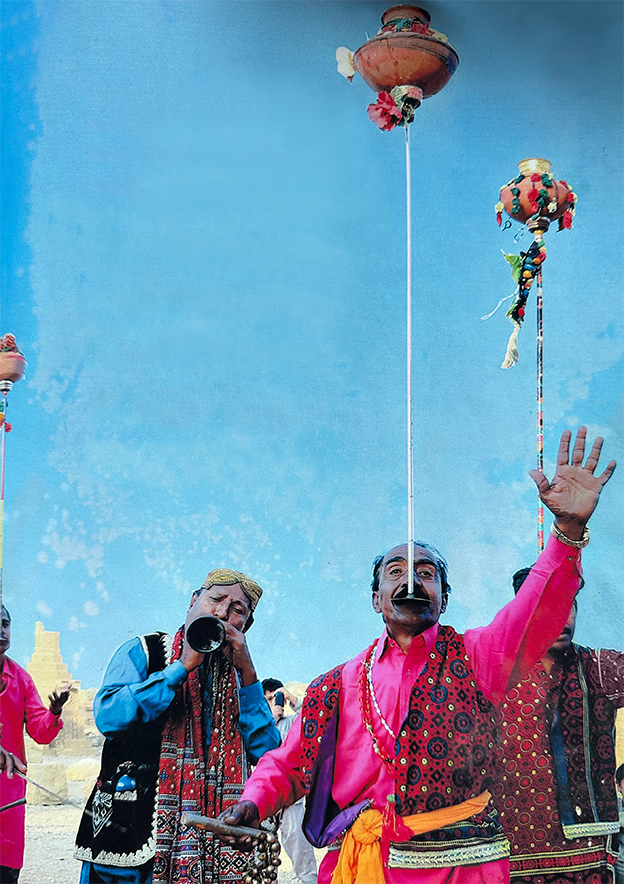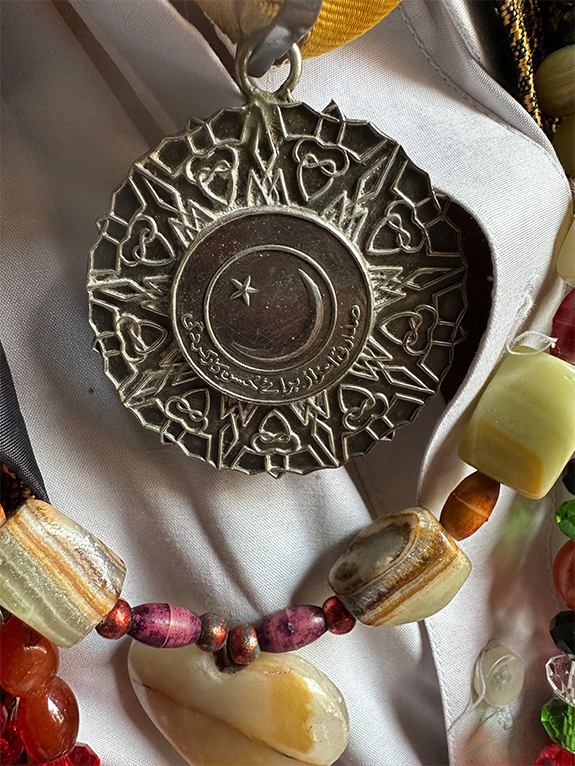KARACHI: Sain Dad, 73, expertly balances a round earthen pot, also known as a “matka” in the local language, four feet high above his head attached to a metal rod. Dad dances to the beat of the drums, using his hands not once to steady the rod as he performs a century-old art only a handful of people in southern Pakistan can perform.
The “Matka Dance” is a traditional folk dance performed in Pakistan’s southern Sindh province which involves expertly balancing an earthen pot above your head. The trick is to not use your hands as you dance while balancing the rod atop your head.
While the exact origin of the matka dance remains unknown, Dad traces its lineage back to Saleh Muhammad Shah, one of Sindh’s earliest known practitioners. Over a century ago, Dad says Shah pioneered the technique of lifting the earthen pitcher using a bamboo stick.
The skill was passed down through generations, until Mehrab Dad, Sain Dad’s father, ultimately taught his son the dance when he was 13 years old. It has been 60 years since then and Dad continues to keep the legacy alive.
“You cannot hold it and then have to control your neck,” Dad told Arab News, demonstrating how to execute the dance. “It is practice. It takes almost ten years to learn this.”

In six decades, Dad has graced various stages across 18 countries, even performing before the late Princess Diana during his tour of the United Kingdom in 1995.
While he is proud of the craft, it is a dying one and Dad lives an impoverished life in Khuda Bux Goth, a Karachi suburb, in a shanty house that only has a mat for a roof.
Apart from him, Dad says only his two sons and two students can perform the matka dance in Sindh.
Sheema Kermani, a renowned classical dancer and performing arts expert, said the matka dance is a “dance of joy and celebration” that was traditionally performed before nomadic communities left one area for another.
“All these folk dancings are rooted in people’s lives, in their work, in the kind of labor that they do,” Kermani explained.

She lamented the lack of government support for the craft, saying that the art form would die unless it received support from authorities.
“You see these people who are still practicing, they are the ones, they need to be supported,” Kermani told Arab News. “This is our heritage. This is the beauty of this culture.”
‘WEALTH OF RESPECT’
Muhammad Saleem Solangi, deputy director of culture in Sindh government, says his department actively promotes traditional artists by sending them overseas to perform at international festivals.
“I personally had our legendary artist, Sain Dad sahib, recommended for the Presidential Award in Islamabad,” Solangi told Arab News, adding that artists receive “substantial remuneration” for their performances at festivals.
“The department, within its limited resources, also provides him with an annual stipend,” he said. “In times of illness or financial crisis, they continue to support him, and they also look after his children.”

The picture taken on January 21, 2025, shows presidential award certificate granted to Sain Dad in Karachi, Pakistan. (AN photo)

The picture taken on January 21, 2025, shows presidential medal awarded to Sain Dad in Karachi, Pakistan. (AN photo)
Dad’s 30-year-old son Muhammad Iqbal is a skilled drummer who accompanies his father and brothers to their performances. He says they typically perform three to four times a month, and during peak seasons, even six. Their earnings range up to Rs 30,000 [$107.66] per performance, which they divide among themselves.
“Whenever there is an exhibition or a wedding program, or a mehndi event, we perform in these programs,” Iqbal said.
But earnings hardly matter for Dad, who says the respect he enjoys from performing means the world to him.
“We may not have wealth in terms of money, but the wealth of respect is immense,” he said.
While the art form may be a dying one, Dad is already teaching his 15-year-old grandson how to balance a water bottle on his head.
And so far, Mehtab Ali is determined to master the matka dance.
“Just like my grandfather and uncle lift the pitcher, I will also, God willing, be able to lift it in four months,” Ali said.

















